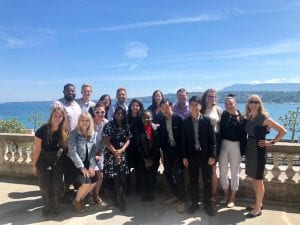This summer I worked at NC State’s Lab for Analytic Sciences (LAS). The National Security Agency (NSA) founded the LAS in 2013 to support the Department of Defense (DoD) and the Intelligence Community’s (IC) needs through government, industry, and academic cooperation. Most of the LAS is focused on technical innovation and system development, but I found a home working with the LAS’s Radicalization Working Group (RWG). The RWG seeks to leverage existing academic models from criminal psychology and sociology to analyze trends in how terror groups attract, indoctrinate, and retain members.
James B. Hunt Library, where the LAS hosted 2019 Collaborator’s Day to find and fund new research efforts for 2020.
I was also selected as a Duke Global Policy Program Fellow in the Spring of 2019. This afforded me the opportunity to take a brief leave from the LAS and travel to Geneva, Switzerland to take a course on Humanitarian Action early in the summer. During the course, we explored issues such as the shrinking humanitarian space, donor perspectives and influence, and the way different agencies and Non-Government Organizations interpret and promote the humanitarian principles. The course blended fascinating lectures and question sessions with site visits to multiple United Nations (UN) agencies and the International Committee of the Red Cross. The course culminated with a policy memo; I wrote mine recommending the US work with the UN to promote environmental programs through the peace process in Afghanistan.
The Duke Global Policy Program Humanitarian track at the Palais Wilson (originally League of Nations headquarters, now home to the UN High Commissioner for Human Rights offices).
The end-product of the summer at LAS was a paper that attempts to look beyond individual risk factors for radicalization and find environmental, contextual, and/or cultural factors that may make individuals more vulnerable to radicalization. This project specifically analyzes jihadist groups that have planned and conducted attacks and facilitation in Western nations. The paper is based on open-source information, and will hopefully be published soon.
This internship helped me to gain a global perspective on salafi-jihadists, and the high volume of existing academic terrorism analyses. It also provided many opportunities to leverage my operational experience to help develop context and the RWG’s greater radicalization narrative. My summer experience undoubtedly broadened me academically and professionally.


